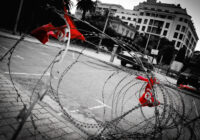After a five-year-long conflict, hope for a new round of peace talks in Yemen begins to fade away a week into Saudi Arabia’s unilateral halt to military operations. Soon after the announcement on April 9, confusion set in over the intent of the ceasefire and the lack of monitoring. Clashes between Houthi militias and Yemeni government forces continue to escalate along various fronts, with Houthi rebels reporting dozens of airstrikes against their positions in Hajja and Mareb.
As the international community welcomed Saudi Arabia’s announcement, the UN special envoy for Yemen, Martin Griffiths, published his framework of how to end the war in Yemen. Soon after, the Houthis introduced their own “Comprehensive National Vision” that included a number of demands, which were mostly directed at Saudi Arabia to prepare the path for a new round of talks and a solution to the conflict. The three announcements exposed the dynamics of the Yemen War and the fog that obscures the path forward.
Can the Saudi Call for Ceasefire in Yemen Work?
New territory gains in al-Jawf, Mareb and Sanaa provinces this year have empowered Houthis and weakened the leverage of both the Yemeni government and the Saudi-led coalition. The dynamics of the conflict continue to shift as Houthis prove their capability to maintain drone and missile attacks across the Saudi-Yemeni border and deeper into the government’s enclave in Mareb. The basic equation to restart the peace process has three parties that are unwilling to compromise, while “warlords continue to convince the Saudis that they can still win the war,” according to Khaled al-Yamani, the former Yemeni foreign minister. Then there are the southern secessionists who continue to search for a guaranteed seat at the big table.
Some international observers saw the Saudi ceasefire as a sign of potential capitulation amid growing criticism of their conduct during the war or in response to economic stress. But “Saudi Arabia is far from accepting defeat or terms dictated by Houthis considering the rebels’ alliance with Iran,” says the Mareb-based Yemeni journalist Ali al-Sakani.
Three Perspectives to Consider
There are three issues to consider. First, Saudi Arabia did not appear to have coordinated its decision to announce a ceasefire with Yemen’s President Abdu-Rabbu Mansour Hadi. Furthermore, media reports and a statement from Deputy Minister of Defense Prince Khaled bin Salman of Saudi Arabia focused on prioritizing public safety amid the coronavirus crisis.
The ceasefire that began at midday on April 9 came as news organizations reported that dozens of Saud family members may have been infected with the novel coronavirus that causes COVID-19, and a day before Yemen reported its first case in al-Shihr, Hadhramawt. A week earlier, other media outlets reported that the public health crisis could have led to British personnel leaving the Riyadh-based Air Operations Center that is vital to the conduct of the aerial campaign over Yemen. In all, Hamed al-Bukhayti, a pro-Houthi writer, sees the abrupt announcement by Saudi Arabia as a move to prioritize its own security at home and in Yemen, while preempting any major damage to the chain of command and vital personnel.
Second, Griffiths presented Houthis and the legitimate government of Yemen with his own initiative on April 10. Again, while his initiative mentioned the importance of addressing the public health crisis, it seems to lack any coordination with the parties. The UN envoy tends to propose new road maps for peace talks following a round of talks with the parties involved, which was not the case this month. Nowhere in his statement did Griffiths address the secessionist Southern Transitional Council (STC), whose allied armed groups continue to engage Houthis in al-Dhale province and pro-Islah party military elements in Shebwa province.
Again, this highlights the limits of both Saudi Arabia’s unilateral announcement and the UN envoy’s proposal. While the Saudi government merely aims at a two-week pause, and the envoy rushed to call for a comprehensive dialogue, the government of Yemen is left condemning continued Houthi aggression in Hajja, al-Jawf, Mareb and Taiz.
Third, on April 9, the Houthis published a prepared and unsigned document in the name of the government for national salvation. The document also shows it was prepared by the Houthis’ Supreme Revolutionary Committee (SRC), which was led by Mohammed Ali al-Houthi, who is now a member of the Supreme Political Council (SPC) that runs the day-to-day affairs. The document lists a number of demands directed at Saudi Arabia as the leader of the coalition that supports the legitimate government of Yemen. In the document, the Houthis address the air and land blockade and economic constraints, including the lack of salaries for government employees.
For the past two years, the Houthis have insisted that any peace process must begin with direct talks with Saudi Arabia, followed by Yemeni-Yemeni dialogue — meaning the Houthis and the Hadi-led government.
The final point in the Houthi document emphasizes the “unity, independence and territorial integrity” of Yemen, excluding any mention of the STC and its own ambitions. It is interesting to note that the Houthis frame the fight in al-Dhale province as clashes with government troops and coalition mercenaries, coupled with the fact that the Houthis have yet to recognize the UAE-sponsored Security Belt or Elite Forces allied with the STC as anything other than mercenaries. The Houthis do recognize the role and responsibility of the UN within their comprehensive approach to the peace process.
Pressure Grows as Leverage Weakens
International aid organizations continue to warn over deteriorating conditions, adding pressure on donors and Houthi authorities. Over recent months, humanitarian agencies have faced mounting challenges that include Houthi obstruction of the delivery of aid across territory under their control, along with threats from donors to cut funds in response to Houthi corruption. UN agencies have confronted the Houthis since May 2019 over obstruction and rampant corruption without any improvement in the relationship. The conflict between the Houthis and aid organizations has escalated as the Saudi-led coalition refuses to loosen restrictions on imports through the Red Sea port of Hodeida or lift the blockade on Sanaa International Airport.
In recent weeks, the Trump administration in Washington is said to have further pressured Saudi Arabia to find a way out of the conflict. The US warned Saudi Arabia over Houthi advances in al-Jawf and Mareb as concerns grow over the Houthis encircling Mareb city from Sirwah in the west and Murad in the south. Yamani, the former foreign minister, noted that “if al-Jawf, Mareb … the entire area falls in hands of Houthis, then it would be impossible for the Saudis to defend the desert,” adding to the challenges to restart peace talks while the Houthis have the upper hand. The government of President Hadi faces the possibility of losing the enclave at Mareb after being expelled from the interim capital of Aden in September 2019.
The pressure on Saudi Arabia grows, not merely as a result of Houthi gains but also as the implementation of the 2019 Riyadh Agreement stalls. Since the withdrawal of UAE troops from southern Yemen last year, Saudi Arabia became the sole mediator between the STC and Hadi’s government. So far, the only point implemented since the signing of the deal has been the return of Prime Minister Maeen Abd al-Malek Saeed to Aden. Saudi Arabia has been unable to end the conflict between pro-STC forces and Islah-affiliated government army units in Abyan and Shebwa, undoubtedly distracting from the fight against Houthis. The Saudi government is now tasked with maintaining two major fronts, one against Houthis and the conflict between the STC and the legitimate government.
As various elements push for more confrontations between parties, in the north and the south, Saudi leadership comes under tremendous strain. It remains to be seen if this two-week pause allows Saudi officials to regroup and present new initiatives to move on the UN-sponsor peace proposal or increase financial and materiel support for Murad tribes and government troops in al-Baydha and al-Jawf provinces.
Just prior to the ceasefire announcement, media reports claimed that Saudi Arabia’s ministry of defense proposed to Crown Prince Mohammed bin Salman the procurement of light-attack helicopters, precision-guided munitions for artillery and drones for aerial surveillance. Yet if the conflict in the south escalates, Saudi Arabia may be forced to reach out to the UAE to exert further influence over the STC.
Undoubtedly, the UAE will reengage under its own terms and a list of demands for Hadi regarding the role of the Islah party within his government and the military. It is doubtful the UAE would play a major role with troops fighting Houthis in Hodeida, but under the right circumstances, it could play a positive role in reaching out to both the Houthis and Iran to push for the start of UN-sponsored peace talks this year.
*[Updated: May 1, 2020.]
The views expressed in this article are the author’s own and do not necessarily reflect Fair Observer’s editorial policy.
Support Fair Observer
We rely on your support for our independence, diversity and quality.
For more than 10 years, Fair Observer has been free, fair and independent. No billionaire owns us, no advertisers control us. We are a reader-supported nonprofit. Unlike many other publications, we keep our content free for readers regardless of where they live or whether they can afford to pay. We have no paywalls and no ads.
In the post-truth era of fake news, echo chambers and filter bubbles, we publish a plurality of perspectives from around the world. Anyone can publish with us, but everyone goes through a rigorous editorial process. So, you get fact-checked, well-reasoned content instead of noise.
We publish 2,500+ voices from 90+ countries. We also conduct education and training programs
on subjects ranging from digital media and journalism to writing and critical thinking. This
doesn’t come cheap. Servers, editors, trainers and web developers cost
money.
Please consider supporting us on a regular basis as a recurring donor or a
sustaining member.
Will you support FO’s journalism?
We rely on your support for our independence, diversity and quality.






